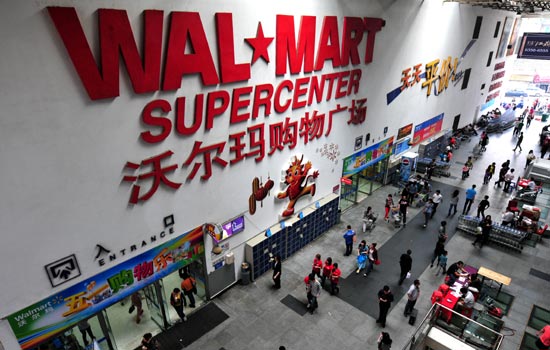
|
 |
|
A Wal-Mart China supercenter in Fuzhou. Experts say that China's high population and rising GDP make the retail market extremely attractive to global supermarket chains. [Photo/China Daily] |
The buzz of fast expansion in China comes with a hefty price tag for foreign retail giants.
Only two decades after China opened up its retail market, foreign players have set up their operations among dozens of Chinese counterparts.
Wal-Mart Stores Inc, the world's largest retailer by sales revenue, entered China in 1996. Nine years later, the US retailer had more than 70 stores.
Since 2007, Wal-Mart China maintained double-digit growth, said Ed Chan, former Wal-Mart China's president and chief executive officer, last year.
The company now has more than 376 outlets and more than 95,000 employees in China.
French retailer Carrefour SA, the world's second-largest retailer by revenue, entered the Chinese mainland in 1995. In April, Carrefour had 206 stores in 64 Chinese cities.
UK's Tesco Plc, the world's third-largest retailer by revenue, entered the Taiwan market in 2004. It now has 110 supermarkets and 14 convenience stores in the Chinese mainland.
Experts said that China's high population and rising GDP make the retail market extremely attractive to global supermarket chains.
Euromonitor International, a London-based consumer market research firm, said the Chinese retail industry is expected to have a market value of more than $1.4 trillion this year. Also, personal disposable income and consumption are expected to keep increasing.
"Following the fast development of the Chinese retail industry, the fast expansion of foreign retailers will benefit their Chinese counterparts as they learn from 'more efficient' business models," said Shi Yongheng, a professor at the School of Economics and Management at Tsinghua University. "They can learn advanced logistics, and the procurement, efficiency and management systems of foreign companies," Shi said.
However, along with the fast network expansion and business success, foreign supermarkets also have to deal with some food safety scandals and other thorny issues.
In March, China Central Television said that Carrefour deceived consumers by selling expired meat and normal chicken as free-range chicken with inflated prices at a store in Henan province.
In January last year, the National Development and Reform Commission, the country's top economic planner, fined 11 Carrefour stores in six cities 500,000 yuan ($78,440) each for overcharging customers. At the same time, some Wal-Mart stores were also caught using illegal pricing methods.
"I am very disappointed with the foreign supermarkets, they should be models in the Chinese market," said Zhao Qi, a 35-year-old hotel employee. "The 500,000 yuan fine was far from enough to punish them."
A 2011 investigative report on business fraud by large supermarkets in China, released by the China Market Order Website, which belongs to the Ministry of Commerce, showed that the annual sales revenue of just one Carrefour store in 2010 was about 230 million yuan, or 460 times the 500,000 yuan fine.
Chinese analysts attributed the recent scandals to bad management and shortage of senior-level staff.


 Washington to remain focused on Asia-Pacific
Washington to remain focused on Asia-Pacific RQFII target blue chips amid bear market
RQFII target blue chips amid bear market Australian recall for top two exporters
Australian recall for top two exporters China fears new car restrictions
China fears new car restrictions